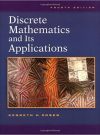CS 205 – Introduction to Discrete Structures I
Course Description
This course introduces student to the mathematical tools of logic and induction, and to the basic definitions and theorems concerning relations, functions, and sets. Later courses in the computer science curriculum build on the mathematical foundations covered here. Particular emphasis is placed on inductive definitions and proofs, with application to problems in computer science. Special topics such as finite state automata and modular arithmetic will be discussed. The course covers 6 major topics. The order of the coverage may vary based on instructor preference. Please refer to individual professor’s canvas course page for more details. Course Topics| Topic 1 – The foundations Logic and Proofs Propositional Logic Applications of propositional logic Propositional Equivalences Predicates and Quantifiers Nested Quantifiers Introduction to Proofs | Topic 2 – Sets, Functions, and Sequences Sets Set operations Set Identities Functions one to one, onto Cardinality of sets Sequences and Summations |
| Topic 3 – Induction Mathematical Induction Strong induction and well-ordering Recursive algorithms Program correctness* | Topic 4 – Relations Representation and operations Closures Graph and paths Transitive Closure Equivalence Relations POSETS Total Orders |
| Topic 5 – Modeling Computation Languages and Grammar Finite State Machines Turing machines* | Topic 6 – Number Theory Divisibility and Modular Arithmetic Integer representations and Algorithms Primes and Greatest Common Divisor Cryptography* |
Lecture Sections
Step 3: Apply the class code: 5B49aMaT
Mobile access: After subscribing open https://cubits.ai on any mobile device.5B49aMT

CS205 meets SAS goals QQ or QR, ITR:
- Formulate, evaluate, and communicate conclusions and inferences from quantitative information. [QQ]
- Apply effective and efficient mathematical or other formal processes to reason and to solve problems. [QR]
- Employ current technologies to access and evaluate information, to conduct research, and to communicate findings, and understand the principles that underlie information systems.[ITR]

Textbook Discrete Mathematics and Its Applications, 2nd Edition, Kenneth Rosen, (Rutgers Edition is Recommended, as it contains only the required chapters)
Academic Integrity
You are responsible for reading and understanding the DCS Academic Integrity Policy. Read the overview as well as the specific policies for exams. Instances of cheating will be punished by a zero grade, a failing grade for the course, and/or referral to your dean, at the discretion of the course staff.
All assignments and exams are individual but we encourage collaboration with course staff and classmates. However, you must be careful how you collaborate. Use the guidelines bellow for reference:
| Course staff | Classmates | Other people | |
|---|---|---|---|
| Discuss concepts with: | Yes | Yes | Yes |
| Acknowledge collaboration with: | Yes | Yes | Yes |
| Expose code/solutions to: | Yes | No | No |
| Copy code/solutions from: | No | No | No |
Recitations
Attend the recitation you are registered for
Problem Sets/ Homework
Plan to submit your assignments on time, no late assignments are accepted.
Assignments are graded Always read the feedback!
Plan to submit your work with at least one day in advance to avoid any submission issues.
Grading
Written assignments and exams are graded by TAs in Gradescope/Canvas (depending on section) and you will receive your score about 10 days after the assignment due date or exam date.
Regrades
For written assignments, quizzes and exams, you have one week after the grades are released to ask for a regrade. Only ask for a regrade if you think there was a grading error, do not request a regrade simply because you think you deserve more partial credit. For more information about regrades please refer to the syllabus (on Canvas).
Canvas
Canvas is a course management tool that will be used to keep students scores and send out announcements. Once registered to the course you will be automatically added to Canvas. Use your Rutgers credentials to login.
The course staff expects all students to read the announcements.
Exams
Please Consult the Instructor’s course Canvas page for Updated information.
These some general guidelines.
=========================================================================
- All exams are given in-person
- You will have 80 consecutive minutes to complete a midterm exam and 3 consecutive hours to complete the final exam.
There are NO makeup exams.
Students that require accommodations, such as extra time, must contact ODS at least two weeks before the quiz date. Email your accommodations letter to the course instructor. Extra time will be added to your exam allowed time
Grading
Please consult your section instructor for more details about grading criteria.
There is no curve: you must earn a minimum of 90% of the total points for an A, 85% for a B+, 80% for a B, 75% for a C+, 70% for a C, and 60% for a D. You will fail the course if you earn less than 60% points.
The cutoffs are strictly followed for each letter grade. A computed grade of 74.99% is a C not a C+.
